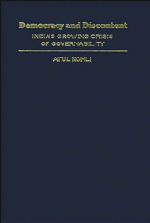Book contents
- Frontmatter
- Contents
- List of tables and figures
- Preface and acknowledgments
- PART I INTRODUCTION
- PART II THE GROWING PROBLEMS OF GOVERNING THE PERIPHERY: POLITICS IN THE DISTRICTS
- PART III ORDER AND BREAKDOWN IN THE STATES
- Introduction: the states
- 8 Breakdown in a “backward” state: Bihar
- 9 Growing turmoil in an “advanced” state: Gujarat
- 10 From breakdown to order: West Bengal
- Conclusion: the states
- PART IV CENTRALIZATION AND POWERLESSNESS AT THE CENTER
- PART V FINAL INFERENCES
- Bibliography
- Index
10 - From breakdown to order: West Bengal
Published online by Cambridge University Press: 05 June 2012
- Frontmatter
- Contents
- List of tables and figures
- Preface and acknowledgments
- PART I INTRODUCTION
- PART II THE GROWING PROBLEMS OF GOVERNING THE PERIPHERY: POLITICS IN THE DISTRICTS
- PART III ORDER AND BREAKDOWN IN THE STATES
- Introduction: the states
- 8 Breakdown in a “backward” state: Bihar
- 9 Growing turmoil in an “advanced” state: Gujarat
- 10 From breakdown to order: West Bengal
- Conclusion: the states
- PART IV CENTRALIZATION AND POWERLESSNESS AT THE CENTER
- PART V FINAL INFERENCES
- Bibliography
- Index
Summary
West Bengal is something of an exception in India's contemporary political landscape. Whereas many states have experienced political instability over the past two decades, West Bengal has been relatively well governed since 1977. That stability has been remarkable because it has not been the result of low levels of political mobilization; West Bengal probably was India's most politically mobilized and chaotic state in the late 1960s. West Bengal's restoration and maintenance of political order naturally direct our attention to the issue of how growing crises of governability can be reversed.
This chapter traces the roots of West Bengal's recent stability to the fact that a well-organized reformist party has remained in power. The Communist Party of India, Marxist (CPM), has repeatedly been elected to office in West Bengal since 1977. The party is communist in name only and is essentially social-democratic in its ideology, social program, and policies. The party's disciplined, effective organization has minimized the debilitating elite factionalism and the related elite-led mobilization and countermobilization so common in some other states. The CPM has also consolidated a coalition of the middle and lower strata by implementing some modest redistributive programs. That systematic incorporation of the poor has reduced the attractiveness of populism and its emphasis on deinstitutionalization. And finally, the CPM has adopted a nonthreatening approach toward property-owning groups, whose roles in production and economic growth remain essential for the long-term welfare of the state.
- Type
- Chapter
- Information
- Democracy and DiscontentIndia's Growing Crisis of Governability, pp. 267 - 296Publisher: Cambridge University PressPrint publication year: 1991
- 1
- Cited by



